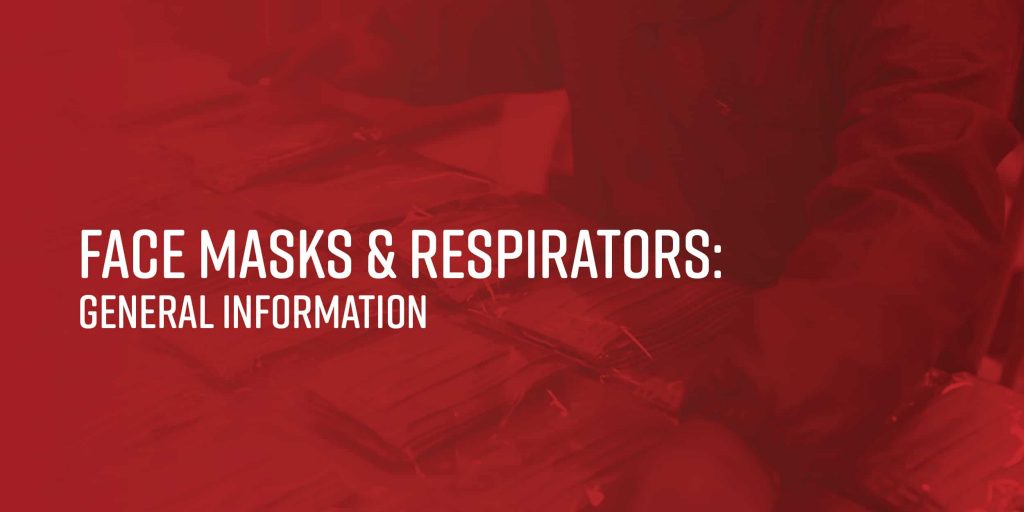With a global pandemic of SARS-CoV-2 (the virus causing COVID-19) you can’t turn on the news without hearing about facemasks, respirators and how people can protect themselves from contracting the virus. Let’s take a look at the different types of masks available and how they can be used to protect individuals from contracting the virus. Some masks are more effective than others, and we’ll address how you can protect yourself and your family.
What are the different types of face masks?
There are several different types of face masks and respirators. They all fall into one of two categories; industrial use or healthcare use.
Masks used in healthcare, often referred to as surgical masks, are certified by the Food and Drug Administration (FDA). This is the type of mask your dentist uses when poking around in your mouth. Manufacturers test these masks for their ability to filter bacteria and particles, among other criteria.
Industrial respirators are used in workplace settings. These are certified by the National Institute for Occupational Safety and Health (NIOSH), although some are certified as healthcare masks by the FDA as well. Industrial respirators are rated for different uses to protect workers from harmful vapors or chemicals.
A common mask in the news is the “N95” mask. This NIOSH rating specifies that the respirator is capable of filtering 95% of airborne matter. Filters may also be rated N99 or N100 if they have even higher filtering capability. The N indicates that the respirator is not oil resistant. Other filters are rated R (somewhat resistant to oil), and P (for use in oil containing environments). These respirators, regardless of rating, must be worn correctly to be effective. They are also not intended for use by children and those with certain underlying conditions. More information about respirator ratings can be found here.
I heard there is a shortage of masks, what’s happening with that?
The increase in patients has led to concerns of a mask shortage for healthcare providers. The FDA and the Centers for Disease Control (CDC) have started taking steps to address this. They’re working with manufacturers of FDA approved masks to increase production, and have reduced the hurdles to import masks from approved factories outside of the United States.
They have also issued guidelines to healthcare providers to effectively and safely conserve existing mask supplies.
Homemade Face Masks and Prevention Methods You Should Follow
Fabric available commercially to the public is untested, and generally not considered effective against airborne pathogens. Making your own mask at home to protect against COVID-19 won’t be as effective as other methods of prevention.
You can find numerous patterns and guides online to sew or make your own mask. Don’t be fooled, these masks are not likely to protect you from the virus. There are a host of other, more effective ways to stay healthy.
While homemade masks will not protect you from contracting the virus, homemade face masks and alternatives (such as a bandana) may reduce the likelihood of transmitting the virus to your family if you are already sick, and approved face masks are not available. Homemade masks are considered to be a crisis level last resort by the CDC.
The best way to protect yourself and your family is to follow the guidelines posted by the CDC. Stay home as much as possible to avoid the possibility of transmission. Avoid large groups of 5-10 or more. If you must go out, try to keep at least 6 feet away from other people and have as little contact with others as possible. This means using self-checkout at the grocery store or curbside pickup for takeout.
What other steps can I take to stay safe from contracting COVID-19?
Wash your hands! It’s been said time and time again but it really is the most effective way to sanitize your hands. Interested in how soap gets rid of bacteria? Check out this link. Make sure to wash your hands for at least 20 seconds before rinsing. If soap isn’t available, use hand sanitizer with at least a 60% alcohol content.
If you do start feeling sick and think it is COVID-19, isolate yourself in your room, and contact your healthcare provider. Many doctor’s offices have started offering telemedicine services so they can safely continue seeing their patients. Keep your mouth covered with a mask; if you don’t have an approved mask a homemade one is better than nothing to prevent you from infecting others. Finally, follow all advice given to you by your doctor.
For more information on how to protect yourself, visit the CDC’s How to Protect Yourself webpage.
How Manufacturers Can Help
If you happen to represent a manufacturing or importing business in the medical industry, the following links may be useful:
FDA Guide to Pre-Market Certification of Surgical Masks
FDA Guidance for Medical Device Importers
Manufacturers interested in helping with the COVID-19 response should also contact their regional MEP center.
Disclaimer: This FuzeHub content is for informational purposes only. It is not professional legal or medical advice.

